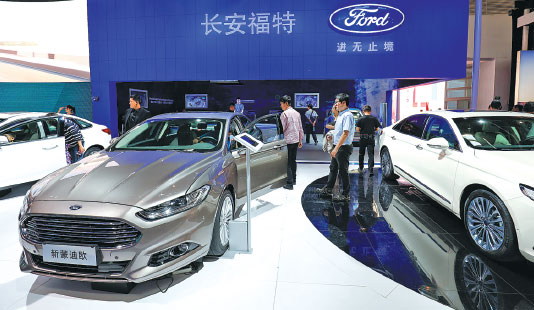Ford unveils China-focused new energy car strategy
|
Changan Ford's booth attracts visitors at an auto show in Beijing. Zhang Haiyan / China Daily |
Ford Motor Company has announced a China-focused electrification strategy, one of the carmaker's latest efforts to seize a decent share of the world's largest new energy vehicle market.
According to the strategy released on April 6 in Shanghai, the first locally made plug-in hybrid is expected to roll off the assembly line in 2018.
Featuring an electric drive range of up to 50 kilometers, the model, Mondeo Energi, is to be manufactured by its joint venture Changan Ford. Ford also confirmed plans to bring an all-new, fully-electric small SUV to China within five years.
"The time is right for Ford to expand our electrified car lineup and investments in China," said Ford President and CEO Mark Fields.
"We are prioritizing our electrification efforts in China to reflect its importance as a global electrified vehicle market and to make lives better, simpler and more cost-effective for Chinese consumers."
China has been the world's largest market for new energy vehicles since 2015. Xu Yanhua, a vice-secretary-general of the China Association of Automobile Manufacturers, said the sales of such cars this year in China are expected to reach 800,000 units, for 60 percent growth year-on-year.
Ford launched the Mondeo Hybrid late last year and the C-MAX Energi plug-in hybrid is already on the road in China.
Ford said it will also start manufacturing electrified powertrains in China beginning around 2020 and offer a comprehensive range of electrified solutions - hybrids, plug-in hybrids and fully battery-powered electric vehicles - to Chinese customers by 2025.
Specifically, 70 percent of all Ford nameplates in China will have electrified powertrain options by 2025, including the full range of nameplates produced by Changan Ford.
By 2025, new energy vehicles are expected to account for more than 15 percent of total passenger vehicle sales in China, according to the Society of Automotive Engineers of China.
The carmaker also plans to expand its new energy vehicle engineering capabilities at its research facility in Nanjing, Jiangsu province, with a focus on incorporating Chinese customers' needs into Ford's next-generation electric car technologies.
The new energy vehicle team in China is leading the development of unique components of new energy vehicles launched in China, such as charging cords and ports.
It is also responsible for the localization of other key technologies and systems, including batteries.
"Ford is committed to developing smarter, greener mobility solutions for the future, and our team in China will be at the forefront of this innovation," said Trevor Worthington, vice-president of Ford Asia Pacific responsible for product development.
Globally, the company is investing $4.5 billion to electrify its most popular, highest-volume vehicles.
Earlier this year, Ford confirmed it will launch 13 new energy cars in the next five years, including the all-new fully electric small SUV that will be sold in China and a hybrid autonomous vehicle designed for commercial operations in mobility services, starting in North America.
(China Daily 04/10/2017 page18)









